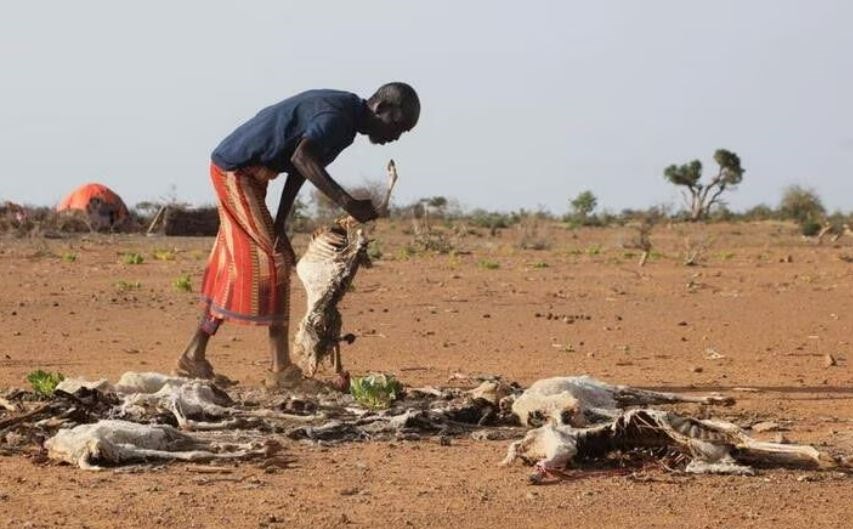Hunger to kill one person in East Africa every 28 seconds: Oxfam
Oxfam expresses concern that the UK government may slash support for the East African food crisis, barely two years after brokering a pact to avoid famine at the G7 conference in Cornwall.
-

Dhicis Guray, an internally displaced Somali man, attends to the carcass of his dead livestock following severe droughts near Dollow, Gedo Region, Somalia May 26, 2022. (Reuters)
The East African food crisis will reach a new apex in July, with one person dying of hunger every 28 seconds between now and then, Oxfam warned.
Drought caused by climate change, combined with continued violence and rising food costs, has left over 40 million people in East Africa suffering from acute hunger, an increase of over two-thirds from last year, with 85,000 people in South Sudan and Somalia on the verge of famine.
Parts of Somalia, Kenya, and Ethiopia have seen five consecutive failed rainy seasons, while South Sudan has experienced a fifth consecutive season of catastrophic floods, reducing people's capacity to cope.
Following the new escalation of violence in Sudan, an extra 2 to 2.5 million people are anticipated to face extreme food insecurity in the coming months. Six thousand refugees migrate to South Sudan every day, putting further burden on a country where 63% already face acute food insecurity, the highest percentage in the world.
According to the World Food Programme (WFP), 345 million people worldwide are now suffering severe food insecurity, with 43 million "one step away" from starvation.
Despite this, the World Food Programme (WFP) said it has lately been forced to slash food distribution in Afghanistan, Bangladesh, and Palestine, with further cutbacks anticipated in Somalia and Chad.
Conflict, climatic shocks, and consequent relocation continue to be the primary causes of world famine. Soaring food costs, exacerbated by the Ukraine conflict, have continued to raise the cost of living, with food inflation in Eastern Africa reaching 25.2 percent in March 2023.
Political failure and injustice 'killing people'
The World Food Programme advocated for a renewed emphasis on social safety, such as insurance plans and labor market laws, as well as for all children to get a healthy meal at school every day.
“We need to step-up assistance, especially when it comes to making our food systems more resilient,” said Cindy McCain, WFP’s executive director. “If we can prepare at-risk communities to handle future climate shocks, they won’t need emergency support the next time there’s a drought or flood.”
Oxfam also expressed concern that the UK government may slash support for the East African food crisis, barely two years after brokering a pact to avoid famine at the G7 conference in Cornwall. The next G7 conference will begin on Friday in Japan.
“The UK has gone from being a world leader in the fight against hunger to a laggard which is failing to live up to its own commitments,” said Magnus Corfixen, Oxfam’s humanitarian lead.
“People are dying not because the world lacks food or money but because of political failure and injustice. G7 countries are among those chiefly responsible for climate change, so the UK and others have a clear moral responsibility to support people in East Africa whose lives are being destroyed by a climate crisis they did not cause,” he added.
“Every day that goes by without action means more avoidable deaths. More than 250 people are likely to die of hunger in East Africa in the time it takes G7 leaders to tuck into their dinner on Friday,” Corfixen concluded.
See next: The state of world hunger

 3 Min Read
3 Min Read








